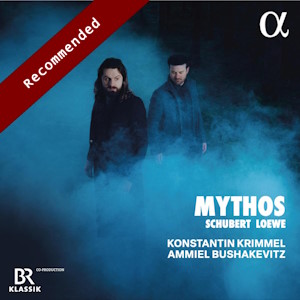
Mythos
Franz Schubert (1797-1828)
Songs
Carl Loewe (1796-1869)
Songs
Konstantin Krimmel (baritone)
Ammiel Bushakevitz (piano)
rec. 2024, Studio 2, Bayerischen Rundfunk, München, Germany
Booklet with notes, texts and translations in English, French and German
Alpha Classics 1088 [68]
German baritone Konstantin Krimmel, award-winning former BBC New Generation Artist, has recorded some well-received discs, including songs by Valentin Silvestrov, Franz Liszt, Robert Schumman, Carl Loewe and Franz Schubert. Here, we get more songs, in themed pairs, by Schubert then Loewe. The themes are those expected in a programme o “myths of the Romantic period […] harking back to the Middle Ages[…] the macabre and the morbid […] the eternal wanderer […] nature as metaphor for an idyllic world”. The collection, then, is skilfully curated, to use the modish expression.
Schubert’s Der König in Thule [the king in Thule] is paired with Loewe’s Archibald Douglas. One of Schubert’s celebrated Goethe settings, this song comes from Faust Part One.The mood ofGretchen’s folk ballad is ideal to begin an album of story-telling. Loewe’s song is another matter. The piece is very good if not quite so distinguished – a substantial saga of eventual reconciliation between former enemies, much the longest piece here at 11:24. It sets all twenty-three stanzas of Theodor Fontane’s poem. Krimmel’s narrative skill is quite button-holing enough to sustain the interest even over such length
Schubert’s Fahrt zum Hades [journey to hell] is a sombre, restrained song to Johann Mayrhofer’s poem. John Reed asserts in The Schubert Song Companion that the song is a “neglected masterpiece”. Krimmel brings a powerful sense of pain and resignation to this sorrowing depiction of life’s last journey. Loewe’s Meerfahrt [see voyage] is equally effective in a different way. Pianist Ammiel Bushakevitz hauntingly sustains its rocking rhythm, and the stanzas are subtly varied to colour the progress of this fairy tale of a sunken city. Krimmel commands a range of vocal colour, always with immaculate control. It is not the least of his accomplishments.
Schubert’s Totengräbers Heimwehe [the gravedigger’s longing], a very fine if not typical song, has a wide vocal range and a change of mood from its third verse to a transfiguring close. Krimmel manages all this in a consummate account. It reveals his skill in seeming to do it all in ‘one voice’, with no obvious break in the passagio, high and low notes equally centred. Loewe’s setting of Goethe’s piece of grotesquerie Der Totentanz [the dance of death] is sung with athletic vocal skill once it speeds up from the third verse on. Bushakevitz is impressively dexterous with the piano’s torrent of notes.
Perhaps the most famous of Schubert’s songs, Erlkönig [the Erlking] famously sets Goethe’s poem as a three-voiced minidrama. Krimmel enacts each character ideally, even the creepy Erlking (not too hammy). The pianist keeps up the swiftness of the drama. The pairing is Loewe’s very different Geisterleben [the life of spirits]. The slow spectral voice from the beyond is perfectly intoned, not without a shiver or two.
The remaining three pairs in this fascinating programme maintain the high standard of execution, there is a useful booklet note, and the sound is ideally atmospheric.
Roy Westbrook
Buying this recording via a link below generates revenue for MWI, which helps the site remain free



Contents
Schubert: Der König in Thule, D367
Loewe: Archibald Douglas, Op. 128
Schubert: Fahrt zum Hades, D526 (Mayrhofer)
Loewe: Meerfahrt, Op. 93
Schubert: Totengräbers Heimwehe D842 (Craigher)
Loewe: 3 Balladen von Goethe, Op. 44: No. 3, Der Totentanz
Schubert: Erlkönig, D328
Loewe: Gesänge, Romanzen und Balladen, Op. 9: No. 4, Geisterleben
Schubert: Am Bach im Fruhling, D361
Loewe: Rückerts Gedichte, Op. 62 No. 4, Süßes Begräbnis
Schubert: Der Wanderer, D493
Loewe: Gesänge, Romanzen und Balladen, Op. 9: No. 38, Wanders Nachtlied
Schubert: An Schwager Kronos, D369
Loewe: 3 Gesänge, Op. 123: No. 3, Die Uhr

















